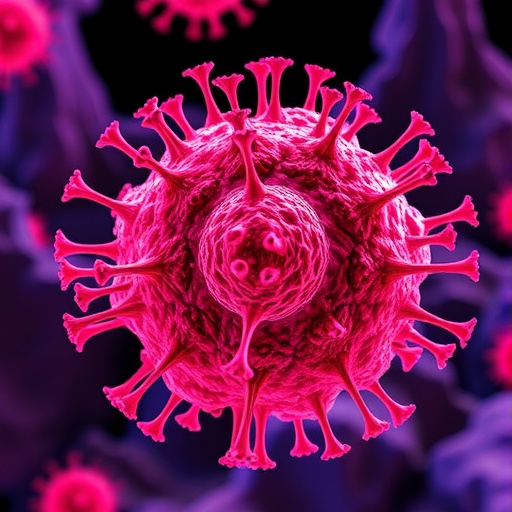In recent years, the application of immunotherapy in the treatment of acute myeloid leukemia (AML) has garnered increasing attention within the scientific community. Among the most promising advancements in this realm are the development and application of Chimeric Antigen Receptor T-cell (CAR-T) and Natural Killer (NK) cell therapies. A recent study led by researchers Wu, Shafiei, and Taghinejad provides profound insights into the evolving landscape of CAR-T and CAR-NK therapies specifically targeting AML. Their findings indicate that these therapies may hold the key to overcoming several existing barriers that hinder the successful treatment of this aggressive type of leukemia.
The study emphasizes that AML is a particularly challenging malignancy due to its heterogeneity and resistance to conventional therapies. Unlike other leukemias, AML is characterized by a complex array of genetic mutations and epigenetic alterations, making it difficult to target effectively with standard chemotherapy and radiation. This high degree of variability among AML patients necessitates the exploration of innovative treatment modalities, such as CAR-T and CAR-NK cell therapies, which offer a more personalized and targeted approach to cancer treatment.
Central to the efficacy of CAR-T therapy is the engineering of T cells to express specific receptors that can recognize and bind to cancer cell antigens. The study highlights recent breakthroughs in identifying novel antigens that are uniquely expressed on AML cells and the potential for these targeted therapies to drastically improve patient outcomes. By harnessing the body’s immune response, CAR-T cells can be programmed to effectively target and eliminate malignant cells while preserving healthy tissue—a feat that has proven elusive with traditional treatments.
Meanwhile, CAR-NK cell therapy represents another promising frontier. Unlike T cells, NK cells are part of the innate immune system and can rapidly respond to a wide variety of tumors without being genetically engineered to recognize specific antigens. This distinction grants them a critical advantage; they are less likely to be affected by the tumor’s heterogeneity compared to T cells. The findings in the Wu et al. study underline the potential for CAR-NK cells to complement CAR-T therapies, providing a multifaceted approach to combating AML.
The research conducted by Wu and colleagues also delves into the significant role of the tumor microenvironment in AML. The microenvironment is often replete with immunosuppressive factors that can inhibit the effectiveness of immune therapies. This study reveals that a deeper understanding of the interactions between AML cells and their microenvironment is crucial for enhancing the efficacy of CAR therapies. By modifying the tumor microenvironment or adjusting treatment protocols to counteract its suppressive effects, researchers may unlock new avenues for successful AML treatments.
Moreover, the study discusses the challenges associated with manufacturing CAR-T and CAR-NK cells. The complexities involved in the ex vivo expansion and genetic modification of these cells represent a significant hurdle in bringing these therapies from the laboratory to the clinic. Researchers Wu, Shafiei, and Taghinejad advocate for the development of streamlined manufacturing processes that can ensure a consistent supply of high-quality cellular products for patients—a necessary advancement to scale these therapies for broader clinical applications.
In addition to manufacturing challenges, the study addresses issues surrounding the safety and potential side effects of CAR-T and CAR-NK therapies. While these therapies can lead to remarkable remissions in patients, they can also provoke severe immune-related adverse effects, such as cytokine release syndrome. The paper highlights ongoing research aimed at refining the specificity of CAR constructs and minimizing off-target effects, thereby enhancing patient safety while maintaining therapeutic efficacy.
As researchers continue to unravel the complexities surrounding AML, the study posits that collaboration across disciplines will be essential for advancing CAR-T and CAR-NK therapies. The integration of genomic analysis, bioinformatics, and personalized medicine will play a pivotal role in tailoring treatment plans to individual patients. This collaborative approach may not only improve outcomes for those with AML but also set a precedent for the treatment of other malignancies.
In light of these challenges and advancements, Wu et al. call for further clinical trials to evaluate the efficacy of CAR-T and CAR-NK therapies in AML. The promise these therapies hold cannot be understated; preliminary clinical data have demonstrated their potential to induce complete responses in heavily pre-treated patient populations. Continued investment in research and clinical development will be imperative in translating these findings into standard care practices.
The study also emphasizes the importance of patient selection in maximizing the benefits of CAR therapies. Identifying patients who are most likely to respond to these treatments, based on genetic profiling and disease characteristics, may significantly enhance treatment efficacy. By integrating biomarker analysis into clinical practice, physicians may be better equipped to customize treatment protocols that align with the unique biology of each patient’s AML.
Ultimately, the work of Wu, Shafiei, and Taghinejad signifies a turning point in the management of AML. The potential for CAR-T and CAR-NK cell therapies to change the treatment paradigm is immense, offering new hope to patients facing this devastating disease. As challenges remain, the contributions of this research not only break through barriers but also chart a path for future innovations in immunotherapy.
In conclusion, the future of AML treatment appears brighter with the advent of CAR-T and CAR-NK therapies. Through overcoming manufacturing hurdles, ensuring safety, and leveraging collaborative research, these therapies could redefine the standard of care for AML patients. The evolution of these strategies may pave the way for a new era in leukemia treatment, ultimately improving survival rates and quality of life for patients confronting this formidable disease.
Subject of Research: Acute Myeloid Leukemia (AML) and Immunotherapy
Article Title: CAR-T and CAR-NK cell therapies in AML: breaking barriers and charting the future
Article References:
Wu, H., Shafiei, F.S., Taghinejad, Z. et al. CAR-T and CAR-NK cell therapies in AML: breaking barriers and charting the future. J Transl Med 23, 1163 (2025). https://doi.org/10.1186/s12967-025-07151-5
Image Credits: AI Generated
DOI: 10.1186/s12967-025-07151-5
Keywords: CAR-T therapy, CAR-NK therapy, acute myeloid leukemia, immunotherapy, tumor microenvironment, treatment efficacy, personalized medicine, cytokine release syndrome.




